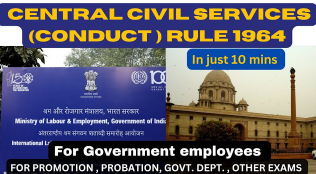
EXTRAORDINARY LEAVE
Extraordinary Leave (EOL) is a vital component of the leave structure provided to Central Government employees, especially in scenarios where all other leave options have been exhausted or are inapplicable. As per the Swamy’s Handbook, which is a trusted and comprehensive guide on service rules for government employees in India, Extraordinary Leave offers a much-needed safety net during unforeseen circumstances—medical, personal, or professional—when regular types of leave are not sufficient or available.
Extraordinary Leave is not a right, but a privilege granted at the discretion of the competent authority. It is considered a leave without pay and is sanctioned only when no other form of leave, such as earned leave (EL), half-pay leave (HPL), or commuted leave, is available or admissible to the employee. In many cases, it serves as a compassionate provision for genuine requirements such as prolonged illness, higher studies, or personal obligations.
According to Swamy’s Handbook, Extraordinary Leave may be granted under three main conditions: when no other leave is admissible; when the employee specifically applies for EOL despite having leave to their credit; and when the authority believes there are special circumstances justifying the grant of EOL. Importantly, the decision rests with the competent authority who must assess the reason and ensure it is not misused or granted routinely.
The duration of EOL is carefully regulated. Generally, the total period of Extraordinary Leave during the entire service should not exceed five years. However, this limit may vary depending on the purpose for which it is sought. For example, for higher education or study leave purposes, EOL may be granted for up to 24 months or more in exceptional cases, with the appropriate Ministry or Department’s approval. For employees undergoing treatment for tuberculosis, leprosy, or cancer, a longer spell of EOL may also be considered, especially when supported by a medical certificate and recommendation from an authorized medical officer.
One of the key features of EOL as outlined in Swamy’s Handbook is its non-earning nature. Since the employee is not on duty and not drawing any pay during this period, no leave is earned during the time spent on Extraordinary Leave. This has implications on pension, increment, and qualifying service unless the period is specifically declared as qualifying service by the authority under certain conditions.
For probationers or employees on temporary appointment, EOL may be granted but with restrictions. In such cases, the period of EOL may not count toward the completion of the probation period unless explicitly stated. Similarly, in cases where EOL exceeds a specific time frame, it can also result in the postponement of annual increments or even delay promotions. Hence, employees are advised to understand these consequences before opting for such leave.
The Handbook further outlines that for Central Government employees who are abroad and cannot join back due to genuine personal difficulties, or visa and immigration-related issues, EOL can be granted with approval from the appropriate department. In such cases, proper documentation and justification are required, and in no instance can the leave be granted indefinitely.

Another important scenario where EOL is frequently used is during a spouse’s posting abroad. If an employee wishes to accompany their spouse, who is posted overseas on official duty or a foreign assignment, EOL can be granted for the duration of the spouse’s posting. This reflects a progressive and supportive outlook on work-life balance and family cohesion within Central Government service rules.
Swamy’s Handbook also states that EOL can be combined with or followed by any other kind of leave, except casual leave. However, since EOL is a form of leave without pay, combining it with other types of paid leave requires specific approval, and clear mention in the leave records. The service book and leave register must clearly reflect all details of EOL, including the purpose, duration, and whether or not it counts as qualifying service for pension and other benefits.
When availing Extraordinary Leave, employees are required to submit a detailed application outlining the reason for the leave, the duration required, and supporting documents such as medical certificates, admission letters (in case of education), or spousal posting orders. The competent authority then reviews the application in light of service rules, employee conduct, and departmental exigencies before granting approval.
It is crucial to remember that EOL, while being a benevolent provision, must be used responsibly. Overuse or inappropriate requests may lead to refusal or adverse entries in service records. It is also not advisable for employees nearing retirement to seek EOL unless absolutely necessary, as it may affect pension calculations and terminal benefits.
In conclusion, Extraordinary Leave is a thoughtful and compassionate provision under Central Government service rules that allows employees to manage personal emergencies or responsibilities when regular leave options are unavailable. Swamy’s Handbook presents a clear and authoritative explanation of the rules governing EOL, highlighting the eligibility criteria, impact on service, and approval process. Government employees should refer to these guidelines carefully and seek administrative support whenever in doubt, ensuring transparency and compliance with the laid-down norms.
Please don’t forget to leave a review

For more information and updates please follow the page and don’t forget to leave your comment.
Disclaimer:
This blog post is intended for informational purposes only. All rights, references, and credits related to official government service rules and guidelines belong to Swamy’s Publications, the authoritative source on these matters. We acknowledge and extend our courtesy to Swamy’s Publication for their valuable work in compiling and publishing official content. This blog does not claim ownership or authorship of any content originally published by Swamy’s Publications.
